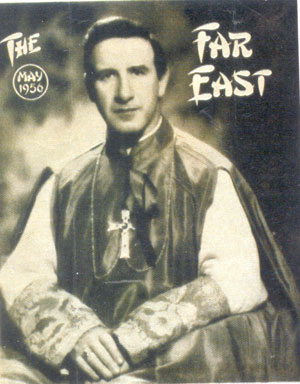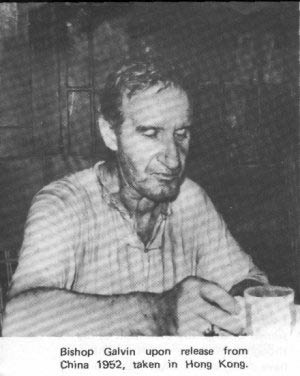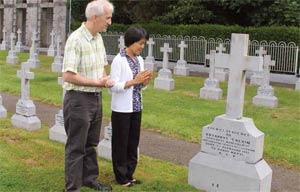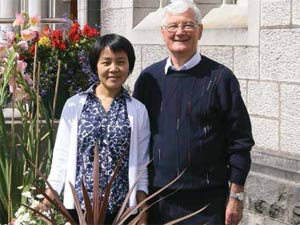Not just the death of a person but of a history
SHANGHAI (SE): Monica was buried in the final days of December last year. A few more months of life would have seen her live for 100 years on this earth.
|
 Known by her Christian friends as Monica, Xia Jingxian had belonged to the Handmaids of Our Lady, a diocesan group of religious sisters set up in Hanyang by Bishop Edward Galvin in the 1930s.
Known by her Christian friends as Monica, Xia Jingxian had belonged to the Handmaids of Our Lady, a diocesan group of religious sisters set up in Hanyang by Bishop Edward Galvin in the 1930s.
However, in the face of the advancing Communist army the Irish bishop disbanded the group for the safety of its members and to give them an opportunity to make a new life in what was to prove a hostile environment.
Monica was a nurse and she arrived in Shanghai as a young woman at a time when the Japanese Imperial Army was menacing the population.
She was one of two girls and three boys and her family was forced to leave its home in Xiantao, Hubei, in 1935 to escape the huge flood that followed the bursting of a dam on the Yangtse River.
They used a small boat to get to Hanyang, where she studied at a Columban school and learned embroidery.
Later, as a sister, she studied nursing and was finally became qualified as a theatre nurse.
She worked at the Columban Hospital in Nancheng in Jiangxi province and later in Shanghai at a former Catholic hospital, now known as Rui Jin Hospital.
“It was a bad time to be a young woman in Shanghai,” she once said. “Nowhere was safe, especially for a young woman.”
But she was making her life in a China that held danger for everyone wherever they went. Nevertheless, she lived in the hope that the Handmaids of Our Lady would one day be reconstituted.
This eventually happened in the 1980s, but it was too late for Monica, as she was by then married and of advanced age.
She had married in 1970, but kept her eventual husband waiting for 10 years because she always thought of herself as a sister.
Eventually when she did tie the knot, she was no longer able to bear children.
Her Catholic faith had also posed dangers for her and she kept the secret love of her life well concealed in the deepest recesses of her heart, known only to herself and the Lord and carefully guarded even from her husband.
Such was the stealth needed for faith to survive in the days of the Cultural Revolution that it was only after some years of marriage that she was to learn that the man who shared her bed each night was also a Christian.
“He was a very good man,” she says of him simply.
 Outliving her husband by some years, she had good memories of married life, but her heart always cherished the memory of the Columban bishop in Hanyang and the priests and sisters that she had worked with in her days with the Handmaids of Our Lady.
Outliving her husband by some years, she had good memories of married life, but her heart always cherished the memory of the Columban bishop in Hanyang and the priests and sisters that she had worked with in her days with the Handmaids of Our Lady.
She could rattle off names, but only the Chinese ones by which the priests and sisters were known at the time, many of which have been lost in the dust of history.
Monica was a person full of love, humour and energy. She loved to entertain people in her simple Shanghai accommodation. She would fuss over them and chide them gently, saying, “When was the last time I saw you!”
Whether visitors were expected or not, there was always a meal, mostly prepared by a relative who lived in the same complex and looked after all her needs. A person endowed with the same love of visitors as herself.
She always had a gift for each visitor too—some coffee or a biscuit, even a piece of warm clothing if it was cold, all of which was pulled out of a cupboard in which she rummaged when someone dropped by unexpectedly.
“Monica was a glimpse into the past of a China I never experienced and will never know,” a much younger friend of hers reflected.
She was full of humour and her sympathy was staunchly with the unofficial Church community.
“There will never be another Chinese Monica. We live in that river of time. Only eternity will reunite us to those moments we fleetingly cherish on this ever so fast journey of life towards our future with God—and hopefully, Monica,” the friend concluded.
A Visitor from China
You have just visited Bishop Galvin’s grave in Dalgan? Yes this was a special moment for me, but also I felt so sad. It is clear that China was at the centre of the Bishop’s life, and that he and so many other Columbans gave their entire lives to that mission. Even today the Columbans continue the Bishop’s work. At the graveside I knelt and bowed three times to his grave. This is a Chinese custom of respect for the dead, one that I have done at funerals of members of my own family. I represented all the Sisters who never got the opportunity to pay their respects to the Bishop. He died in 1956, and, as all Columbans had been expelled since 1953, we were not even aware of his death until years later. I also visited the grave of Fr John Blowick, the co-founder of the Society. When you speak of Bishop Galvin you smile and look happy? I never knew the Bishop, but there is a picture of him on our convent wall. Our older Sisters tell stories of him: how he protected them at the time of the Japanese invasion; how he would share whatever he had with them; how he cared for them when they were sick, and made sure they had enough food. He supported their education and told them, "You are the hope of the Chinese women". We are so proud of him, the father who took care of us. Yes, the older Sisters always told us how much he loved us. They believe that from heaven he still looks
after us. So I prayed for the coming Chapter; for an increase in vocations to the congregation; for the sick; and for the grace to grow in holiness and to be guided in our choice of ministries. You also visited Newcestown, Co. Cork, the Bishop’s birthplace? Yes, the people were so welcoming, they seemed happy to greet somebody from China with close links to the Bishop. The people remembered the Bishop and various Columbans from the area who had worked in China. They were so hospitable, they have such a strong faith, and seemed so happy and hopeful. Clearly the Bishop’s memory is cherished, and the Parish Priest said he would like to maintain contact between his parish and our diocese. I asked the several prayer groups to remember our small convent in their prayers and gave them pictures of Our Lady of China. What of the Sisters’ apostolate today? Once we were revived, in the beginning we did not know what we should do. When I entered, four days later, one of our oldest Sisters asked two of us postulants to take a flask of water and some towels. We went to visit an elderly blind woman who lived all her life in one room. We helped her to wash and then prepared some hot food. She was so happy. Our job is really to help in the parish. We help with the preparation and administration of the sacraments; we go to the rural areas and stay for a week with the people, teaching them to pray and to sing. We also visit people with disabilities, those in hospital, the elderly. We are still learning skills to organise lay people to work together for sustainable pastoral work. Are you hopeful for the future of the Church in your area? Yes, I never doubt it but I come from a rare Catholic background. I experienced a personal conversion when I decided to become a Sister, because I allowed the Gospel, Jesus’s word, to change my life. Even though the economy in China gets better and better, I think there are people like me who need the Gospel. So, I think we will continue to find ways to bring faith to the people. As long as we need faith, we will have hope. What of your visit to Ireland? In the past I’d heard stories of Ireland. Now I saw the real people, the real Columbans and also their graveyard. I talked to many Columbans who spent their lives on mission and often I felt moved by their vibrant faith. I was delighted to visit Mayo to meet Fr John Blowick’s sister-in-law, Mrs Theresa Blowick. Her kindness and the stories she told about Fr John allow me to understand in a clearer way the deep faith of one who gave so much during the early years of the Columbans. In China we continue to benefit from that deep faith. It gives me great encouragement that you continue to live out your founders’ charism. You are studying now in the US? I study both social work and pastoral ministry. I study how to relate this work to China, how to combine both faith and service. I know I am very privileged. I have a special responsibility to continue the Bishop’s work, though today conditions are quite different. We still practice his ideals, his care for people, his zeal to spread the faith. We are grateful for the support of the Columban Fathers, but we need the help of your constant prayers and also those of your readers. Fr Dan Troy has worked in China over the past fifteen years. |

